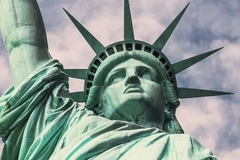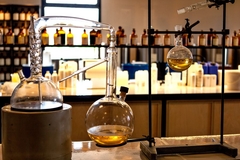May in review: California bill slams sunscreens, TikTok talks potential US ban and Clarins discusses sustainability goals

03 Jun 2024 --- May saw scores of personal care and beauty companies from France support government efforts to slash bureaucracy and streamline efforts in manufacturing and packaging. In California, a US congresswoman introduced the “No Toxic Chemicals in Cosmetics Act” to ban harmful chemicals. At the same time, the EU’s Scientific Committee on Consumer Safety (SCCS) flagged genotoxicity concerns with titanium dioxide in oral cosmetics.
Earnings were stellar for giants like Estée Lauder Companies, which saw a 5% jump in quarterly sales, while ELF Beauty surpassed the billion-dollar mark in sales for the first time thanks to solid performance across its retail and e-commerce channels.
Personal Care Insights connected with newsmakers such as TikTok to learn more about the powerhouse platform’s plans to fight the US government’s potential ban. We also talked to Clarins about its 70th anniversary and the global cosmetic giant’s sustainability goals, while vanilla exporters in Uganda told us why they’re stepping up efforts to become a dependable supplier of an ingredient used frequently in aromatherapy and fragrance-based product formulations.
Learn more about the significant stories in March that made headlines in the personal care and beauty sector.
May
Federation of Beauty Companies targets regulatory simplification between France and EU
The Federation of Beauty Companies proposed three measures for manufacturing and packaging standards and streamlining regulations in response to the French government calling for a slash in business bureaucracy. The “simplification action plan” features 52 measures to overhaul government, regulation and legislation systems. It seeks to accelerate and simplify business procedures by reducing litigation risk and supporting less punishment.
.jpg) The Environmental Working Group called out the FDA for scores of sunscreen products falling short of “adequate protection.” Estée Lauder Companies (ELC) reported a 5% jump in third-quarter net sales to US$3.94 billion thanks to double-digit growth in Europe and the EMEA region, driven by more robust sales in Asia travel retail. President and CEO Fabrizio Freda said, “La Mer, Estée Lauder, Jo Malone London, Le Labo and The Ordinary led organic sales growth, driven by beloved hero products and highly sought innovation.”
The Environmental Working Group called out the FDA for scores of sunscreen products falling short of “adequate protection.” Estée Lauder Companies (ELC) reported a 5% jump in third-quarter net sales to US$3.94 billion thanks to double-digit growth in Europe and the EMEA region, driven by more robust sales in Asia travel retail. President and CEO Fabrizio Freda said, “La Mer, Estée Lauder, Jo Malone London, Le Labo and The Ordinary led organic sales growth, driven by beloved hero products and highly sought innovation.”
EWG calls out FDA’s slow progress as 1 in 4 sunscreens fail adequate protection standards
The Environmental Working Group (EWG) released its 2024 Guide to Sunscreens, revealing that three-quarters of approximately 1,700 evaluated SPF products fell short of “adequate” sun protection, with many containing ingredients that pose health risks. Emily Spilman, a program manager for Healthy Living Science at EWG, said, “Consumers deserve better [since] many of the products reviewed don’t offer balanced UVA and UVB protection.”
“American cosmetics need a makeover”: Bipartisan bill seeks to ban toxic chemicals in personal care
US congresswoman Anna Paulina Luna introduced the “No Toxic Chemicals in Cosmetics Act” to ban harmful chemicals, especially parabens, from cosmetics and personal care products to safeguard health. By amending the Federal Food, Drug, and Cosmetic Act, the bipartisan bill aims to clarify that sunscreens and cosmetics bearing or containing parabens — including esters of para-hydroxybenzoic acid — are “adulterated.” Luna claims, “Americans are being poisoned [with] organizations like the FDA approving these products.”
REACH amendment: EU Bans D4, D5, D6 to enhance safety and environmental protection
The Official Journal of the European Union publication banned the use of cosmetic silicones octamethylcyclotetrasiloxane (D4), decamethylcyclopentasiloxane (D5) and dodecamethylcyclohexasiloxane (D6) in wash-off and leave-on products. The restrictions are in addition to those already imposed by REACH (Registration, Evaluation, Authorisation and Restriction of Chemicals) on rinse-off cosmetic products containing D4 and D5.
TikTok talks: Powerhouse platform discusses potential US ban and impact on beauty sector
Personal Care Insights talked to the powerhouse platform about the regulatory challenges it faces and the advantages it offers to beauty businesses while highlighting successful brands. The US gave its parent company, ByteDance, nine months to sell the video-hosting service or risk a nationwide ban. TikTok told us the ban would impact “thousands of creators and small businesses and deprive some 170 million users of the global community of inspiration and fun that TikTok represents.” TikTok is fighting the bill in court.
 ELF Beauty became a billion-dollar business with solid performance across retail and e-commerce.ELF Beauty surpassed US$1 billion in annual sales, marking its strongest year of growth, with Its quarterly report beating analyst estimates. In its fourth quarter, ELF saw a whopping 71% rise in net sales to US$321.1 million thanks to solid performance across retail and e-commerce channels. Tarang Amin, ELF Beauty’s chairman and CEO, said the future looked even brighter “being in the early innings of unlocking the full potential of the company across cosmetics, skin care and international markets.”
ELF Beauty became a billion-dollar business with solid performance across retail and e-commerce.ELF Beauty surpassed US$1 billion in annual sales, marking its strongest year of growth, with Its quarterly report beating analyst estimates. In its fourth quarter, ELF saw a whopping 71% rise in net sales to US$321.1 million thanks to solid performance across retail and e-commerce channels. Tarang Amin, ELF Beauty’s chairman and CEO, said the future looked even brighter “being in the early innings of unlocking the full potential of the company across cosmetics, skin care and international markets.”
EU scientific committee warns of titanium dioxide’s potential genotoxicity in oral cosmetics
The Scientific Committee on Consumer Safety (SCCS) found potential genotoxicity concerns in its final opinion on titanium dioxide (TiO2) safety in oral cosmetic products. After analyzing data on 44 pigmentary and 40 nano grades of TiO2 used in cosmetics, the SCCS concluded that the evidence is insufficient to rule out the possibility of genotoxicity for most TiO2 grades in the products. The SCCS looked at studies from the European Food Safety Authority.
Uganda boasts vanilla supply chain resilience with two-harvest capability amid climate uncertainty
Personal Care Insights talked to the Association of Vanilla Exporters of Uganda Limited (Vanex) about its plans to seek critical vanilla exporter status amid challenges confronting top exporter countries like Madagascar. Vanex explained the benefits of vanilla sourced from a country it hopes can be seen as a dependable supplier and how it can benefit the personal care industry. Vanilla is used in aromatherapy and fragrance-based products. It is also known for its anti-aging and soothing properties.
Clarins unveils “very first” GenAI customer care bot “Clara” and discusses sustainability
Clarins celebrated its 70th anniversary with the launch of Clara, the “very first generative AI-powered customer care bot in the prestige beauty industry.” The global cosmetics giant also purchased 50 hectares of farmland in the south of France to help further its sustainability initiatives. The family-owned company talked to Personal Care Insights about “sustainable agriculture, vertical sourcing and short-circuit production [to become] an exemplary brand in ingredient sourcing and traceability.”
By Anita Sharma













